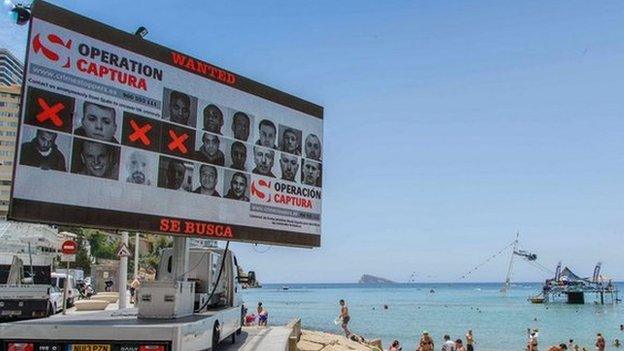Jack Shepherd: Can a fugitive remain on the run forever?
- Published

Jack Shepherd failed to appear in court and his whereabouts remain a mystery
Three days before Jack Shepherd was due to stand trial for manslaughter by gross negligence, police found he had disappeared. He was convicted in his absence of killing Charlotte Brown in a drunken speedboat crash and has spent the last six months on the run. Can a fugitive really evade the law forever?
Shepherd had been trying to impress Ms Brown when he let her drive his defective boat along the River Thames on their first date in 2015.
It was a drastic error of judgement which ended with the speeding vessel capsizing, throwing the pair into the water, where the 24-year-old drowned.
Rather than face the consequences, the 30-year-old web developer skipped bail before his court appearance and fled, sparking a manhunt that Ms Brown's family described as "prolonging the agony for everyone".
He was sentenced regardless to six years in prison, not a day of which he has served, and his whereabouts remain a mystery.
But should police prioritise his capture above the two dozen hardened criminals on its most wanted list - and where do officers even start when a suspect goes on the run?
The first step is to prevent a fugitive leaving the country. When officers update the UK's police national computer, marking a suspect as internationally wanted, an alert will be circulated to forces at all UK ports and across Europe, via a crime-fighting database known as the Schengen Information System II.
"If he tried to get out through one of the established ports using his ID, he'd get picked up," said Nick Biddis, a retired detective superintendent who led Kent Police's capture of Kenneth Noye, one of Britain's most infamous fugitives.
This, however, can be circumvented using smaller ports or forged documents.
And while it is not known if Shepherd has left the country, recent cases have demonstrated the ease with which criminals can slip over borders.

Charlotte Brown and Shepherd shared two bottles of wine at dinner before the speedboat crash
Shane O'Brien, who was wanted over the murder of Josh Hanson in 2015, left the country on a private flight from Biggin Hill Airport.
He was arrested by Czech police in February 2017 while using fake Italian documents and released before officers discovered his true identity. He remains at large.
Peter Bleksley, a retired Met Police detective and star of Channel 4's Hunted - which pits a team of professional investigators against contestants - said forged documents were no longer the preserve of well-connected underworld figures, thanks to illicit marketplaces on the dark web.
Tech-savvy Shepherd was "going to know his way around the dark web better than your average Joe," he said.
A fugitive's "family and known associations" would be the next port of call.
"You rattle the cages of those that are near and dear to him," said Mr Bleksley. "Search their homes, check their devices. Is each and every number allocated to a person or is there a phone call received from an unknown number?"
In some cases, officers would be deployed to monitor their movements.
"But this is all manpower intensive," he said. "I have my concerns about just how many officers will be actively working on [Shepherd's] case."
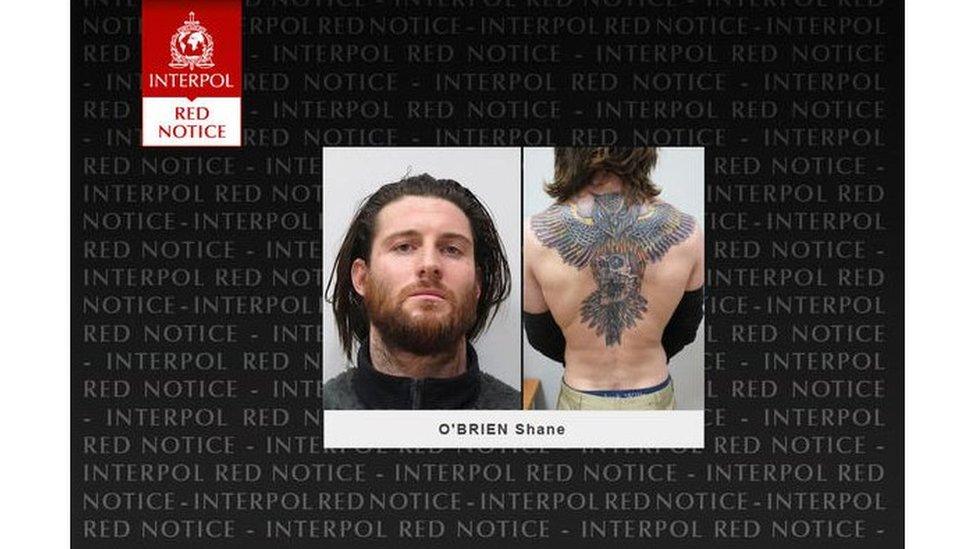
Shane O'Brien was caught using fake documents but released before his true identity was discovered
Other tactics include utilising a network of cameras, known as the automatic number plate recognition system, to track a suspect's car. An application to the Home Office for authority to trace known phone numbers, email addresses and social media accounts, could also be sought.
"You look at any phones he has used. Who has he called and emailed? Has he laid his hands on a burner [disposable] phone?" asked Mr Bleksley.
Bank accounts can be monitored or frozen.
In Shepherd's case, the Met said he had not accessed any bank or line of communication that they knew of.

You might also be interested in

Tony Imossi, a private investigator with more than 30 years' experience, said staying "below the radar" required support. To avoid detection Shepherd would have had to ditch his phone, bank accounts and all known online accounts, as well as staying away from government agencies, like the NHS.
He would also have had to avoid contacting his loved ones.
"It's very difficult for someone to drop out of their circle and live completely hidden," said Mr Imossi. "You need someone to have a bank account in your name, to have a car insurance in your name, all this is expensive. It requires a lot of support."
If he flew out of Britain before border staff were alerted, Shepherd could have left Europe along an established route without leaving a trace, the investigator said.
"He could have caught a flight to Gibraltar... From there he can cross the border into Spain and could then get to Morocco and be in Africa without leaving any footprint."
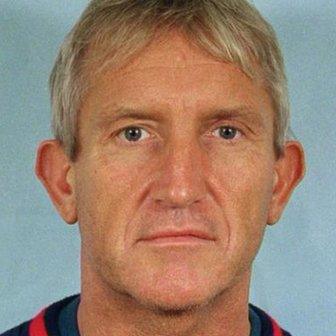
Kenneth Noye, who was suspected of being involved in the 1983 Brink's-Mat gold bullion raid, fled to Spain after killing a stranger in a road-rage confrontation
Mr Imossi said the focus would be on building a profile of Shepherd and his acquaintances, before carrying out "intensive surveillance" and door-to-door inquiries.
"He will emerge eventually. He would not be living a life of luxury, drinking cocktails on a sandy beach. At some point he will run out of finances and help and will live an uncomfortable life. Even [Great Train Robber] Ronnie Biggs had to come home eventually."
The stress of evading police would eventually take its toll, Mr Bleksley added.
"Going on the run is draining, both physically and mentally."
The National Crime Agency (NCA) plays a vital role in tracking fugitives and co-ordinating the actions of police forces in the UK and abroad. It declined to detail its methods but a spokesman said officers work to "develop intelligence" using both "open sources and police sources of information".
The agency's UK International Crime Bureau works with Interpol.
The extradition unit of the Met's serious and organised crime command, known as SCO7, tracks foreign criminals in the UK. The force relies on counterparts in similar units abroad - like the Serious and Organised Crime Team in Holland, which has become a notorious bolthole for British fugitives.
In recent years, the Dutch unit has been responsible for capturing James Taylor, Anthony Downes and Kirk Bradley - responsible for knife, gun and grenade attacks in Liverpool.
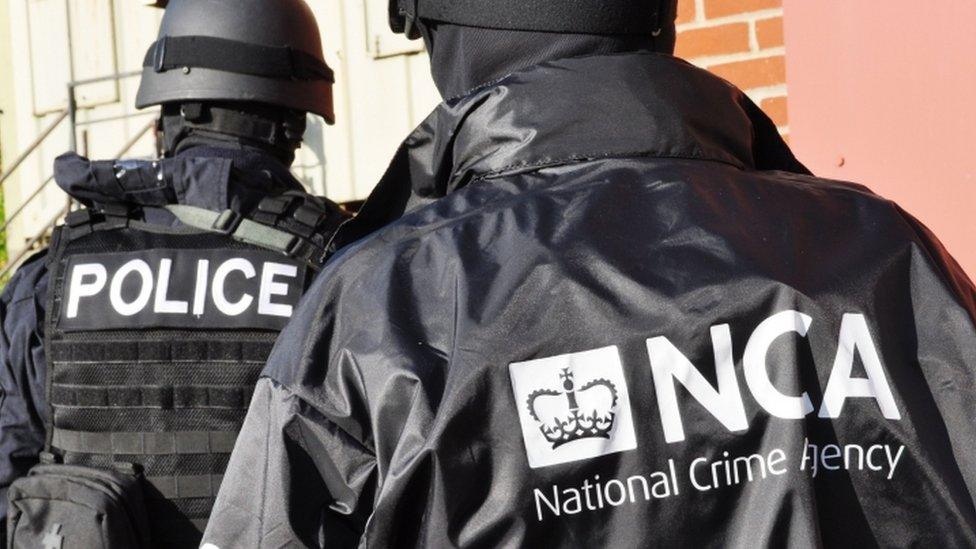
Police and the NCA work together to catch and extradite fugitives
In the case of Shepherd, the Met would only confirm that the search is "being supported by detectives from other specialist departments". An international arrest warrant has been obtained and law enforcement agencies across the world have been alerted.
Det Ch Insp Mick Norman, who is leading the hunt for the force's homicide and major crime command, said Shepherd may be using the accounts of friends or associates to evade arrest and extradition and urged anyone helping him to "do the right thing".
Kevin Moore, a retired chief superintendent with more than 40 years of policing experience, said fugitives were often only caught when arrested for another crime.
Despite technological advances - and revelations about the vast reach of Britain's intelligence services - breakthroughs in long-running manhunts also often come from tip-offs.
"Unless there is intelligence fed back that an individual is in a particular place, it's like looking for a needle in a haystack," Mr Moore said. "If you have got the financial backing or are a high level criminal, if you keep your head below the parapet, it's quite easy to disappear. It's a big world."

Ms Brown's sister, Katie, has called for a review of how Shepherd was able to communicate with his lawyers while evading justice
Mr Biddis, who led the team that tracked down Noye in Spain following a tip-off, said police were likely to receive daily suspected sightings of Shepherd, the majority of which are "probably cobblers".
"You can't ignore any. It's like panning for gold. You just have to sift through it all, looking for a nugget."
Mr Bleksley believes somebody will recognise Shepherd and contact police, describing it as "his Achilles heel".
If he is located abroad, police will face the question of how to bring him back to the UK. In countries with existing extradition treaties - or the 28 members of the EU, which observes European Arrest Warrants - the process would be straightforward, Mr Biddis said.
Elsewhere, police will have to request the Home and Foreign Offices to go through diplomatic channels and the country's judicial process.
"That can take weeks or months, if they fight it."
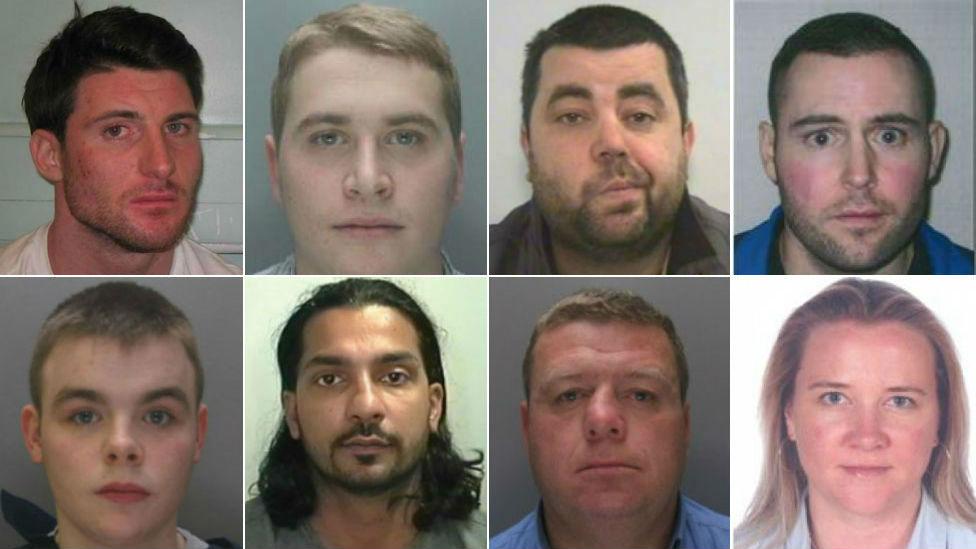
The NCA's most-wanted list features murderers, drug importers and billion-pound money launderers
According to the NCA, 183 suspects wanted in Britain were arrested under European Arrest Warrants last year.
The agency features 27 people on its most wanted list who have been convicted, or suspected of, crimes including murder, rape and importing class-A drugs. Shepherd is not currently listed.
Ms Brown's sister, Katie, from Dartford, Kent, has called for a review of how he was able to communicate with his lawyers and win the right to appeal against his conviction, while evading justice.
"In a perfect world there would be a team of experienced, dedicated, resourceful detectives applied to the search for Shepherd," Mr Bleksley said.
"But, the fact of the matter is there are murders happening in the UK on a daily basis and they will need investigating too."
- Published10 January 2019

- Published26 July 2018

- Published7 July 2015
